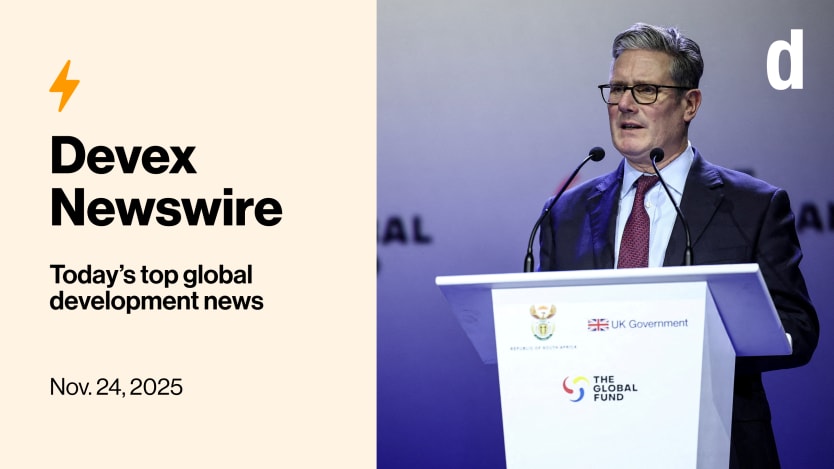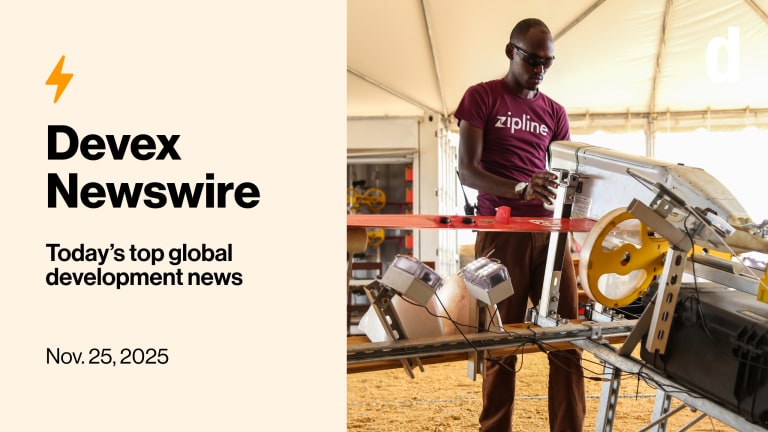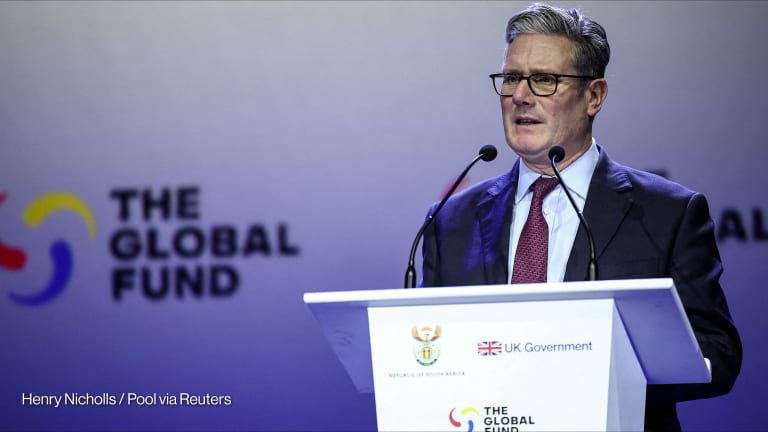Devex Newswire: US doles out pleasant surprise for the global community
Presented by Pivotal

The verdict on the highly anticipated replenishment of The Global Fund to Fight AIDS, Tuberculosis and Malaria is in — and it’s complicated.
Also in today’s edition: Former USAID chief Bill Steiger talks “America First” health strategy, and we check in with Pekka Haavisto, a candidate to lead UNHCR.
Promising prognosis?
On the one hand, the Global Fund reached $11.34 billion of its $18 billion target — on its face, a clear disappointment. On the other hand, the U.S. pledged $4.6 billion, down from the $6 billion committed during the last funding cycle.
Ostensibly, that should count as a loss as well, but with the Trump administration’s penchant for, well, penny-pinching on foreign aid and disdain of multilateralism, the pledge was actually a pleasant surprise. It even means the U.S. remains the fund’s largest donor.
Jeremy Lewin of the U.S. State Department noted the “modest decline” was to “account for needed reforms and efficiencies,” but also praised the organization’s track record and the role he expects it will play in America’s new vision of global health, my colleague Sara Jerving writes.
“The best days of America's health care leadership are yet ahead,” he declared, calling the Global Fund a “critical partner” in the new “America First Global Health Strategy,” which “enacts much-needed reforms to bloated programs, deploying resources more prudently towards high-impact programs, and creating positive incentives for recipient countries’ self-reliance and local control.”
In its last three-year replenishment in 2022, the fund raised a record-breaking $15.7 billion.
But now it’s not just the U.S.: Pledges from other donors such as Germany and the United Kingdom were down. Some countries also haven’t yet pledged, so a final tally isn’t expected until early next year.
That’s got some observers dour despite the fact that fears the U.S. wouldn’t pledge a dime didn’t come to pass.
“The results of the Summit point towards a budget gap for the Global Fund over the next three years. But the warning signs were flashing long before, as nearly all its major donors have slashed their aid budgets,” says Janeen Madan Keller of the Center for Global Development. “The reality is that the Global Fund is staring down an era of austerity. It must make tough cost-cutting decisions if it is to stand any chance of ending the epidemics of AIDS, tuberculosis, and malaria.”
Read: Global Fund raised $11.34 billion with a surprising US pledge
Related: Europe is cutting development spending, and it’s not because of Trump (Pro)
+ Not yet a Devex Pro member? Start your 15-day free trial today to access all our expert analyses, insider insights, funding data, events, and more. Check out all the exclusive content available to Pro members.
He’s just a Bill
Take note of Lewin’s praise of the Global Fund. It came laced with the swipe that global health programs are too bloated and create too much dependency on aid — hence, in the Trump administration’s summation, the beauty of the “America First” health strategy.
That sentiment was similar to what William “Bill” Steiger, former USAID chief of staff in the first Trump administration, expressed at a U.S. Global Leadership Coalition event in Congress last week, attended by my colleague Adva Saldinger.
“The most important innovation that is in the ‘America First Global Health Strategy’ is asking other countries, other governments, and their partners to do their share,” he said. “The criticism of the administration is correct that we have allowed some of our partners to free ride off of our investments for far too long, and it is time for them to step up. But they need help.”
Now take note of that last bit — “they need help.” It suggests a softer stance than some current Trump officials. Bolstering that theory is the fact that he called on Congress to reauthorize the President’s Emergency Plan for AIDS, or PEPFAR, and the President’s Malaria Initiative.
He also hinted that the State Department, gutted by layoffs, could use some reinforcements, recommending a working capital fund at the agency that would allow it to use program dollars to bring in additional staff.
“There are simply not enough people working on assistance in the State Department, and the State Department is clearly not going to spend its administrative dollars on hiring more people. A working capital fund would allow them to use program dollars, of which there are a lot more, to help support that effort within guidelines,” he said.
Read more: Ex-top USAID official details wish list on health and funding fixes (Pro)
+ ICYMI, we launched The future of global health — a new series that explores the consequences of cuts to foreign aid and the efforts to find a new direction for global health. Catch up on our coverage.
Power in a union
Steiger also said Congress should give the State Department the legal backing to negotiate bilateral compacts as part of the administration’s America First Global Health Strategy. Those compacts are a centerpiece of Trump’s strategy. They’re also a concern for the African nations that would enter into the agreements.
Why? Because they’re bilateral, not multilateral — thus African governments could lose their collective bargaining power sitting alone across the negotiating table from the world’s most powerful nation.
The continent has been working via the African Union to approach the global community as a bloc. While individual countries may not have much leverage, they can benefit from the aggregate power of 55 countries. But bilateral agreements with the U.S. move the continent away from this model, experts told Sara last week in Nairobi at the Africa Health and Development Annual Research Symposium.
“I think that African countries need to be careful. We’ve been moving in a direction of trying to reduce fragmentation, because we recognize that our markets are relatively small individually,” said Dr. Sam Oti of the International Development Research Centre.
Oti also had a suggestion for African governments before engaging with the U.S.
“That they sort of come together continentally and agree on what is a minimum acceptable terms and conditions for Africa, I think this is critical,” he said. “Otherwise, I think we are going to lose that collective bargaining power that we could have harnessed from [the continent’s population of over] 1 billion people.”
Read: Will African nations lose their leverage in an ‘America first’ health plan?
ICYMI: US health strategy aims to position African governments as customers
Plus: US template for bilateral health deals bypasses WHO pandemic negotiations
Are we all here?
This weekend saw the G20 leaders’ summit in Johannesburg, attended by heads of state from many of the world’s most powerful economies. The summit marks the end of a year of South African presidency — the first time an African nation has held the position.
Given the absence of a U.S. delegation, the decision to publish a declaration is controversial, but it’s acknowledged only in the opening line: “We, Leaders of the G20, who gathered in Johannesburg.” The final declaration, in line with much of South Africa’s presidency, shone a spotlight on issues that matter to the African continent, calling for peace in Sudan, the Democratic Republic of Congo, Palestine, and Ukraine in that order. It includes four pages on the need to invest in disaster response, mitigation and adaptation, and respond to the “urgency and seriousness” of climate change.
Read: G20 summit in South Africa adopts declaration without the US
+ Don’t miss out! Our special COP30 wrap-up newsletter is sending today! Get the essential takeaways from the U.N. climate summit straight to your inbox. Plus, keep an eye out for our G20 special edition newsletter coming this week.
Finn de siecle
The race to run the UN Refugee Agency — and our coverage of the candidates — continues with Finnish lawmaker Pekka Haavisto, who isn’t making campaign promises he may not be able to deliver on.
Haavisto, speaking to my colleague Colum Lynch via Zoom from the Finnish Parliament, acknowledged that restoring hundreds of millions of dollars in U.S. and European funds this year may not be in the cards.
“I don’t have the magic stick, of course, to replace all the funds that are not coming from the member states,” he said. “The task of the leadership of the UNHCR is to look at all possible sources of funding,” he added, voicing hope that traditional donors can be persuaded to “do more” and that nontraditional donors — including wealthy Persian Gulf states — can step up.
Haavisto joins a slate of about a dozen contenders keen on leading the U.N.’s premier but financially strapped refugee agency, which has been hit by U.S. aid cuts, forcing it to lay off some 5,000 workers this year. But it has also faced a funding drop from traditional European donors, who have soured on refugees in recent years.
Haavisto suggested that public discussion about refugees is often fueled by misinformation. “Our current refugee debate, for example, in many European countries, including my own country, Finland, is sometimes based on assumptions and not so much on the facts,” he said.
Watch: Finland's Pekka Haavisto — no ‘magic stick’ to fix UN refugee funding gap
Check out Colum’s interviews with the other candidates:
• Matthew Crentsil: A lone African seeks top UN refugee job
• IKEA chief Jesper Brodin: ‘I am the peacock in the land of penguins’
• Christine Schraner Burgener: Refugee camps unfit for refugees
In other news
UNICEF and Gavi, the Vaccine Alliance have reached a deal to bring down the price of the malaria vaccine by 25%. [UN News]
Dozens of schools in Nigeria have shut down following the abduction of more than 300 schoolchildren by armed men in the northern part of the country. [Times of India]
The Department of Government Efficiency, or DOGE, has been dissolved with eight months still left in its contract. [The Guardian]
Sign up to Newswire for an inside look at the biggest stories in global development.
Search for articles
Most Read
- 1
- 2
- 3
- 4
- 5








